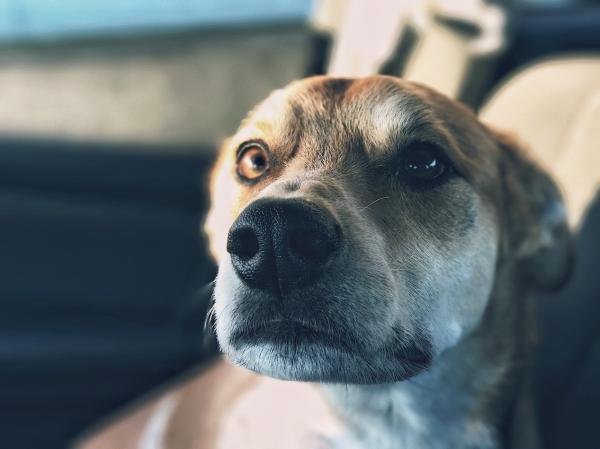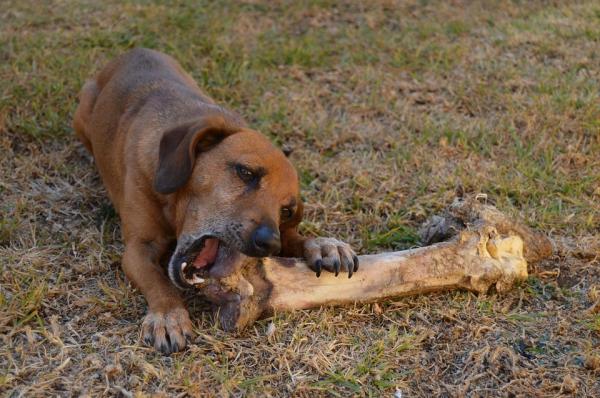
Understanding what healthy dog poop looks like is key when it comes to understanding a dog’s health status. Is your dog pooping white, yellow or black feces? Have you noticed white chalky dog poop on the ground instead of the normal medium brown not-too-soft poop? Your dog’s poop color and poop consistency can tell you a lot about whether or not your dog is suffering from an illness and therefore, if your dog’s feces changes, you need to take note!
If you are wondering ,‘‘What does white dog poop mean?’’ Here at AnimalWised we’ll be discussing the main causes of white dog poop as well as what to do if your dog is pooping white.
White dog poop: causes
The main cause of white dog poop is a diet of raw meat and bones. This such diet often leads to white hard feces that break up like chalk when you try to pick it up. The reason why this causes a dog’s poop to be white is because of the high presence of calcium in the bones that a dog ingests. Sometimes, if you offer your dog an excessive amount of bones, you may find that your dog has trouble defecating despite repeatedly trying. This constant desire to defecate is known as 'tenesmus'. If your dog follows a high raw meat and bone diet and is struggling to poop, we recommend consulting a veterinarian in order to aid in intestinal transit facilitation to avoid the appearance of anal fissures or obstructions.
White chalky dog poop: a dog’s diet
So, if you feed your dog a diet that includes bones, should you completely stop feeding your dog bones? In principle, if you are following your veterinarian’s instructions with this specific diet, no. But there are some things that you can take into consideration to ease your dog’s digestion and avoid the worrying presence of white dog stools, these include:
- Include more fiber in your dog’s diet, like pumpkin or green beans.
- Reduce the amount of bones in your dog’s diet, vary the type or choose to only offer them on certain weekdays.
- Test the use of probiotics to promote intestinal fermentation and aid in a dog’s adaptation to this diet. Opt for those that include live bacteria such as Enterococcum faecium or Lactobacillus and other substrates. These allow existing beneficial bacteria thrive, such as inulin and a disaccharide.
- In occasional situations of constipation, opt for an intestinal lubricant like liquid paraffin. You can also offer your dog a couple of tablespoons of olive oil every 12 hours until the constipation remits, changing the dose according to the results. For more, we recommend reading our article where we discuss everything you need to know about olive oil for dogs, including its uses and benefits.
Using other drugs that you may normally use for canine constipation is not recommended. This is because, before stimulating intestinal motility, one must ensure that the hard stools have not compacted and formed any intestinal obstruction.
It’s also important to remember that in field dogs for example, with free access to farms and other open spaces, white stools may also occur. This is often due to the fact that field dogs sometimes ingest eggs or carrion. This extra calcium from an egg shell and carrion skeletons can lead to white and hard dog poop. This is why, especially if your dog defecates in private, you have to make sure to routinely analyze your dog’s feces for any abnormalities.
White dog feces: treatment
Once you’ve controlled your dog’s bone intake and have started on a new homemade diet, you should notice a small variation in dog poop color and consistency during the first week. If you follow your veterinarian’s recommendations and apply a sufficient change to your dog’s diet, your dog’s feces should go back to normal. For more, we recommend reading our article where we look at all the different types of dog poop and what they mean.

White chalky dog poop: acholic stool
Stercobilin is the brown pigment that is formed from bilirubin and gives color to a dog’s stool. If the formation or transport of bilirubin is altered, it is inevitable that your dog’s stools may appear whitish-grayish in color. This grey dog poop is referred to as acholic stool in dogs.
Grey dog poop: causes
A lack of stercobilin in dogs can be caused by a liver disorder, whereby the liver is unable function correctly. As a result, that pigment will not accumulate in the gallbladder and will not evacuate with the rest of the substances to the duodenum after meals. Main causes of liver failure in dogs include:
- Hepatic neoplasia in dogs: primary or secondary tumors (breast or bone tumor).
- Congenital (birth) alteration at the level of hepatic vascularization.
- Acute hepatitis in dogs: inflammation of the liver, due to the ingestion of toxic substances, either of viral origin (canine hepatitis virus) or of bacterial origin (leptospirosis).
- Cirrhosis in dogs: hepatic deterioration as a result of a prolonged illness like subacute hepatitis sustained over time. This is the final result of many liver diseases that may have gone unnoticed. For more, read liver failure in dogs.
- Pancreatitis in dogs: inflammations of the pancreas. We suggest taking a look at our article where we tell you everything you need to know about pancreatitis in dogs.
It’s important to note that any alteration in the transport of bilirubin can cause its deficit, this includes: gallstones in the gallbladder (rare in dogs) and an obstruction of the bile duct by an abdominal mass that prevents bile evacuation. In these cases of lack or absence of bile evacuation into the duodenum, the stools tend to appear grey or ‘clear’ in color.
Grey dog poop: liver symptoms
If you notice any of the below mentioned liver problem symptoms in dogs, we recommend consulting a veterinarian as soon as possible:
- Frequent stools, with acholic and/or grey dog poop.
- Vomiting.
- Itching of unknown origin.
- Jaundice.
- Anorexia in dogs.
- Hyporexia in dogs.
- Increase in water intake.
- Distension of the abdomen (ascites) or pain.
- Intolerance to exercise.
In the case of any of the above symptoms, a veterinarian will likely need to perform a series of laboratory tests, including blood counts, a coagulation screen and feces check. In more severe cases, ultrasounds and additional tests may be necessary.

White dog poop: mucus in dog poop
What causes mucus in dog stool? Sometimes dog poop may appear light in color but in fact, it is not. In these cases it is actually the gelatinous mucus covering the poop which leads us to think that its color has changed.
This mucus in dog poop usually appears in the case of intestinal irritation caused by a sudden dietary change or parasitic disease, such as giardiasis in dogs.
To avoid this type of intestinal irritation in dogs, make sure that when changing your dog’s diet, it is done gradually with the help of probiotics (if necessary). In addition, be sure to always follow your dog’s vaccination and deworming schedule strictly.
What causes white dog poop? : parasites
When one starts a deworming schedule for dogs, it is possible that a dog already suffers from intestinal parasites. Have you noticed that there are worms in your dog’s stool? If so, the type of deworming medication your dog has been administered may be the cause. Various deworming medications may function differently, for example, some products force the parasite to disengage from the intestinal wall while others kill it directly. This way in which the deworming medication functions may have an effect on how your dog’s feces appear. This does, however, vary from case to case. Therefore, we recommend consulting your veterinarian if you do notice any strange appearance after beginning deworming.
It’s also important to note that tapeworms in dogs, such as the Dipylidium caninum type, can also result in white worms in dog stool. These worms can be so prevalent that we may mistake their presence for white stool. For more, we recommend reading our article where we discuss everything you need to know about deworming dogs.
The saying that "we are what we eat," is true, especially when it comes to our animals. So don’t forget, if you notice anything abnormal when it comes to your dog’s poop, we recommend consulting a veterinarian immediately. For more about dog stool problems, we suggest taking a look at:
- Blood in dog feces.
- Why is my dog vomiting and has diarrhea?
- Soft diet for constipated dogs.

This article is purely informative. AnimalWised does not have the authority to prescribe any veterinary treatment or create a diagnosis. We invite you to take your pet to the veterinarian if they are suffering from any condition or pain.
If you want to read similar articles to What Does White Dog Poop Mean?, we recommend you visit our Intestinal problems category.